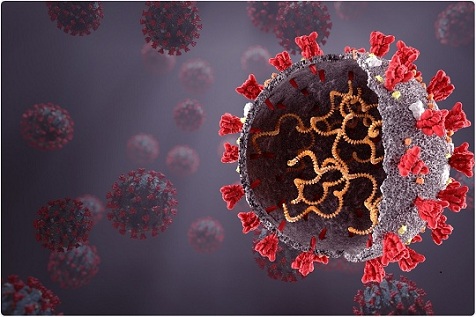Researchers Warn That L452R & Y453F Mutations Found In Emerging SARS-CoV-2 Variants Including Delta And Epsilon Evade Cellular Immunity
Source: SARS-CoV-2 Mutations Aug 01, 2021 4 years, 6 months, 3 weeks, 4 days, 15 hours, 38 minutes ago
A new study led by researchers from Kumamoto University-Japan and , Weizmann Institute of Science-Israel have found that the
L452R mutation of the SARS-CoV-2 spike protein, which is common to two mutant strains, the Epsilon and Delta, can evade cellular immunity through the human leukocyte (HLA) A24 and can increase viral infectivity.

According to the study team which also involved scientists from other institutions and hospitals, numerous SARS-CoV-2 variants with naturally acquired mutations have emerged. These mutations can affect viral properties such as infectivity and immune resistance. Although the sensitivity of naturally occurring SARS-CoV-2 variants to humoral immunity has been investigated, sensitivity to human leukocyte antigen (HLA)-restricted cellular immunity remains largely unexplored.
The study team demonstrated that two recently emerging mutations in the receptor-binding domain of the SARS-CoV-2 spike protein, L452R (in B.1.427/429 and B.1.617) and Y453F (in B.1.1.298), confer escape from HLA-A24-restricted cellular immunity. These mutations reinforce affinity toward the host entry receptor ACE2. Notably, the L452R mutation increases spike stability, viral infectivity, viral fusogenicity, and thereby promotes viral replication. These data suggest that HLA-restricted cellular immunity potentially affects the evolution of viral phenotypes and that a further threat of the SARS-CoV-2 pandemic is escape from cellular immunity.
The study findings were published in the peer reviewed journal: Cell Host and Microbe.
https://www.cell.com/cell-host-microbe/fulltext/S1931-3128(21)00284-5
The COVID-19, caused by the SARS-CoV-2 coronavirus, continues to spread globally, with the total number of cases reaching over almost 199 million. To date, the pandemic has claimed over 4.23 million lives.
Even with the advent of COVID-19 vaccines and a vigorous vaccination drive, many SARS-CoV-2 variants with naturally acquired mutations have emerged.
Some of these mutations affect viral properties such as transmissibility, infectivity, and evasion of immune responses.
The study team showed that the emerging mutations L452R and Y453F in the SARS-CoV-2 spike receptor-binding motif evade (HLA) A24-restricted cellular immunity.
Meanwhile, the L452R enhances spike stability, viral fusogenicity, and viral infectivity. Hence, the findings suggest that HLA-restricted cellular immunity potentially affects the evolution of viral phenotypes.
Despite vigorous vaccination efforts in most countries and over 3.85 billion doses being already been administered, the threat of COVID-19 is far from over. This is because emerging variants of concern (VOC) may escape immune responses induced by vaccination or natural infection.
The initially reported and well-studied mutant contains a D614G substitution in the spike (S) protein. Recent studies have shown that the D614G mutation enhances the binding affinity of SARS-CoV-2 to the angiotensin-converting enzyme 2 (ACE2) receptor, the viral cellular pathway. It is also more infectious and easily transmissible. However, there is no evidence suggesting that the D614G variant is tied to increased lethality.
However
in late 2020, new SARS-CoV-2 variants emerged ie the B.1.1.7, the B.1.351, and the P.1 variants reported in the United Kingdom, South Africa, and Brazil, respectively. At the end of 2020, another lineage, the B.1.427 also called the CAL.20C, occurred in California, United States.
At present, the world is grappling with the Delta variant (B.1.617.2), which emerged in India. Delta has been linked to increased infectivity, transmissibility, severe illness, and even death.
Importantly, mutated viruses are mainly due to error-prone viral replication, and the spread of emerged variants is associated with the escape from immune responses. Various SARS-CoV-2 mutants may resist neutralizing mediated antibodies from COVID-19 patients and those who have received full doses of COVID-19 vaccines.
These new emerging variants may escape another protection system against pathogens called the cellular immunity caused by cytotoxic T lymphocytes (CTLs). These recognize non-self epitopes present on virus-infected cells through the HLA class I molecules. This is called CTL-mediated antiviral immunity.
Interestingly recent evidence showed that human CTLs could recognize HLA-restricted SARS-CoV-2-derived epitopes. Also, the functionality of virus-specific cellular immunity correlates inversely with COVID-19 severity. Thus, CTLs play pivotal roles in controlling SARS-CoV-2 infection.
The study team explored the potential emergence of SARS-CoV-2 mutants that can evade HLA-restricted cellular immunity in the current study.
In order to arrive at the study findings, the team used immunological experiments to show that an antigen obtained from the SARS-CoV-2 spike protein is strongly recognized by the HLA-A24-restricted cellular immunity, which is often seen in Japanese people.
The researchers also conducted a large-scale sequence analysis of SARS-CoV-2 strains and demonstrated that HLA-A24 could recognize mutations in the spike protein region.
Alarmingly, the study team found that at least two naturally occurring substitutions in the receptor-binding motif of the SARS-CoV-2 spike protein, the L452R and Y453F identified in the B.1.427 and B1.1.298, can be resistant to the HLA-A24 cellular immunity.
These mutations also increased the virus’s binding affinity for ACE2.
Detailed experiments using pseudoviruses demonstrate that the L452R substation also enhances viral infectivity. Specifically, the L452R mutation increases the stability of the S protein, thereby enhances viral replication.
Corresponding author, Professor Dr Kei Sato from the University of Tokyo told Thailand Medical News, “These data suggest that HLA-restricted cellular immunity potentially affects the evolution of viral phenotypes and that a further threat of the SARS-CoV-2 pandemic is its ability to escape cellular immunity.”
It is important that the L452R mutation be investigated further since the latest variant of concern, the B.1.617 lineage or the Delta variant, has caused widespread surging cases in India, Thailand, Indonesia and other countries. Notably, the L452R mutation is a hallmark of this variant.
For more about
Mutations taking place on the SARS-CoV-2 genome, keep on logging to Thailand Medical News.
